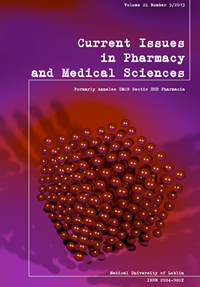Tools for a correct design and quality assessment of pragmatic randomizedcon trolled trials: PRECIS, PR-tool and Prag mascope tool
DOI:
https://doi.org/10.12923/j.2084-980X/26.3/a.11Słowa kluczowe:
health technology assessment (HTA), PRECIS, PR-tool, Pragmascope tool, quality assessmentAbstrakt
Identification of scientific data in the systematic reviews required for the rational decisions on health policy is an important tool in determining the validity of the financing of treatment from public funds based on the health technology assessment (HTA). The primary source of scientific medical evidence are randomized controlled trials (RCTs), but their features markedly reduce the possibility of the transfer of the results to the routine practice. In this situation an important role begin to play pragmatic randomized controlled trials (pRCTs), providing highly reliable information about drug effectiveness in contrast to observational studies or registries. Here, we described three suitable universal tools, which can be used during the designing or evaluation of reliability of pRCTs: PRECIS, PR-tool and Pragmascope tool.
Bibliografia
1. Alford L.: On differences between explanatory and pragmatic clinical trials. N. Z. J. Physiother. 35, 12, 2007.
2. Kaczyński L., Solnica B.: Pragmatic randomized controlled trials as a source of data in the assessment of effectiveness of medical technology. Prz Lek. 69, 703, 2012.
3. Koppenaal T. et al.: Pragmatic vs. explanatory: an adaptation of the PRECIS tool helps to judge the applicability of systematic reviews for daily practice. J Clin Epidemiol. 64, 1095, 2011.
4. Loudon K. et al.: Making clinical trials more relevant: improving and validating the PRECIS tool for matching trial design decisions to trial purpose. Trials. 14, 115, 2013.
5. Macpherson H.: Pragmatic clinical trials. Complement Ther. Med. 12, 136, 2004.
6. Möller H-J.: Effectiveness studies: advantages and disadvantages. Dialogues Clin Neurosci. 13, 199, 2011.
7. Riddle D.L. et al.: The Pragmatic-Explanatory Continuum Indicator Summary (PRECIS) instrument was useful for refining a randomized trial design: experiences from an investigative team. J Clin Epidemiol. 63, 1271, 2010.
8. Thorpe K.E. et al.: A pragmatic-explanatory continuum indicator summary (PRECIS): a tool to help trial designers. CMAJ. 180, E47, 2009.
9. Thorpe K.E. et al.: A pragmatic-explanatory continuum indicator summary (PRECIS): a tool to help trial designers. J. Clin. Epidemiol. 62, 464, 2009.
10. Tosh G., Soares-Weiser K., Adams C.E.: Pragmatic vs explanatory trials: the pragmascope tool to help measure differences in protocols of mental health randomized controlled trials. Dialogues Clin Neurosci. 13, 209, 2011.
11. Treweek S., Zwarenstein M.: Making trials matter: pragmatic and explanatory trials and the problem of applicability. Trials 10, 37, 2009.
Pobrania
Opublikowane
Numer
Dział
Licencja
Prawa autorskie (c) 2013 Autorzy

Praca jest udostępniana na licencji Creative Commons Attribution-NonCommercial-NoDerivatives 3.0 Unported License.


